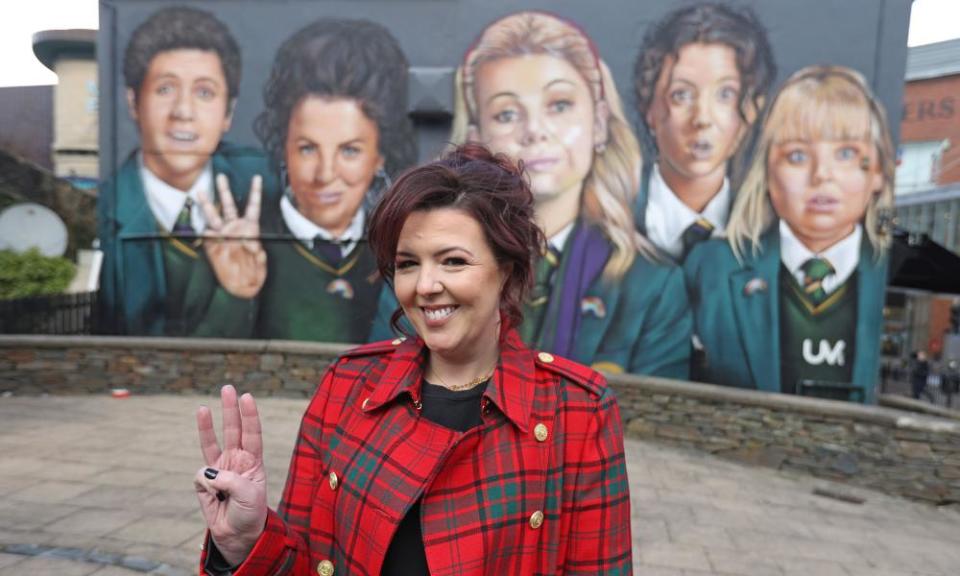Taylor Swift: inspiring students about the importance of being earnest
Now that students at English universities are getting into an average debt of more than £45,000 each – I still recall, with horror, the news that one student had borrowed £189,700, or the equivalent of turning the heating on for a couple of weeks this winter – I wonder if they might start to expect more celebrity speakers at graduation ceremonies. You can see thousands of bands at Glastonbury for £280. It can’t cost that much to book the presenters of Loose Women, say, to do 30 minutes of life advice.
In the US, there is a long tradition of famous people delivering commencement speeches, from authors to politicians to tech bosses. My favourite is the director John Waters, who can always be relied on for the good stuff. “Parents, now it’s time to talk to you. God, these kids can be brats, can’t they? Entitled little bastards,” he told one crowd of students, in 2015; in 2020, he told virtual graduates to “travel beyond the valley of the humour-impaired and over the top of sexual anarchy to a coup d’etat of crackpot capitalism”.
Funnily enough, Taylor Swift used that exact same line when she gave the commencement speech at New York University last week. Only kidding. Of course she didn’t. But the approaches taken by famous people to this odd task, of delivering a speech that mixes support, congratulations, personal anecdotes and advice on how to live well (spoiler alert: being rich really helps) are varied and fascinating.
Swift, who picked up an honorary doctorate, opted for “life hacks” over advice, all with a smattering of self-deprecating humour. “I’m 90% sure the main reason I’m here is because I have a song called 22,” she told the class of ’22. She told the students not to be ashamed to try, a sentiment I found oddly touching, and very Swift-esque in its unabashed sincerity. “I’m a big advocate for not hiding your enthusiasm for things,” she said. She argued that there was “a false stigma around eagerness in our culture of ‘unbothered ambivalence’”, which sounds as if she’s putting in the work to make that honorary doctorate a real one. “Unbothered Ambivalence and the 19th-century gothic” etc.
To continue the spirit of Swift’s earnestness, it is a lovely sentiment, and a rare one now, in a culture that is becoming increasingly arch and distant, filtering its emotions only through humour and gags. But nonchalance is boring, and it gets nothing done. If this is the start of the big enthusiasm comeback, then fittingly, I’m all for it.
Lessons with Lisa McGee’s Derry Girls were a delight

I watched the final two episodes of Derry Girls twice, once before they aired, because I reviewed them, and then again when they were on TV, because sometimes big telly moments like that are better in a crowd. I cried both times. It was a near-perfect ending to what has been a wonderful series, and has rightly been credited with educating viewers about the Good Friday agreement, and doing so with jokes to spare. It was brilliant and it was very moving.
Its creator, Lisa McGee, told a press screening that one of its most powerful storylines, in which Erin and Michelle fall out owing to Michelle’s family history, wasn’t originally part of the episode at all. When filming was delayed by Covid – which is why there were so many scenes involving Clare being in a different place to everyone else, as Nicola Coughlan was also filming Bridgerton – McGee had time to think, and pitched the idea of the friends’ conflict playing out against the backdrop of the referendum. “Let’s just bring the political and the personal crashing together, because it’s the only time we’re going to get a chance to do it,” she said.
The BBC ran a piece last week asking where all the new classic sitcoms were, pointing out that a One Show poll of the best-loved BBC series had seen 10 sitcoms named by viewers, but none of them made in the last 15 years. Naturally Derry Girls wouldn’t count, as a Channel 4 resident, but that last episode tipped it into the category of new classic sitcom for me, and I suspect it will be rewatched for years to come.
Star man Sam Ryder makes a virtue of second spot

There is an old movie, from 2009, called Whip It, a sweet little film directed by Drew Barrymore, about the sport of roller derby. I get a brief, fairly unimportant bit of dialogue from it stuck in my head all the time. When the team we’re supposed to root for loses a match, they happily start chanting “We’re number two! We’re number two!”. The joke being that there are two teams in a roller derby match.
This year’s Eurovision Song Contest has been quite the journey, for any number of reasons, not least a victory for Ukraine that arrived on the wave of a definitive and heartening public vote. But for the first time in a great many years, the UK was a contender. Sam Ryder’s Space Man had a second chance last week, with Ryder cheerfully campaigning for it to be the first British Eurovision entry to go to number one since Gina G’s Ooh Aah… Just a Little Bit, in 1996. Alas, Harry Styles, in what might be the only unpopular move of his career, pipped Ryder to the post with As It Was. But if Ryder has learned anything over the last seven days, it’s how to be gracious in defeat. He’s number two! He’s number two!
• Rebecca Nicholson is an Observer columnist

 Yahoo Movies
Yahoo Movies 